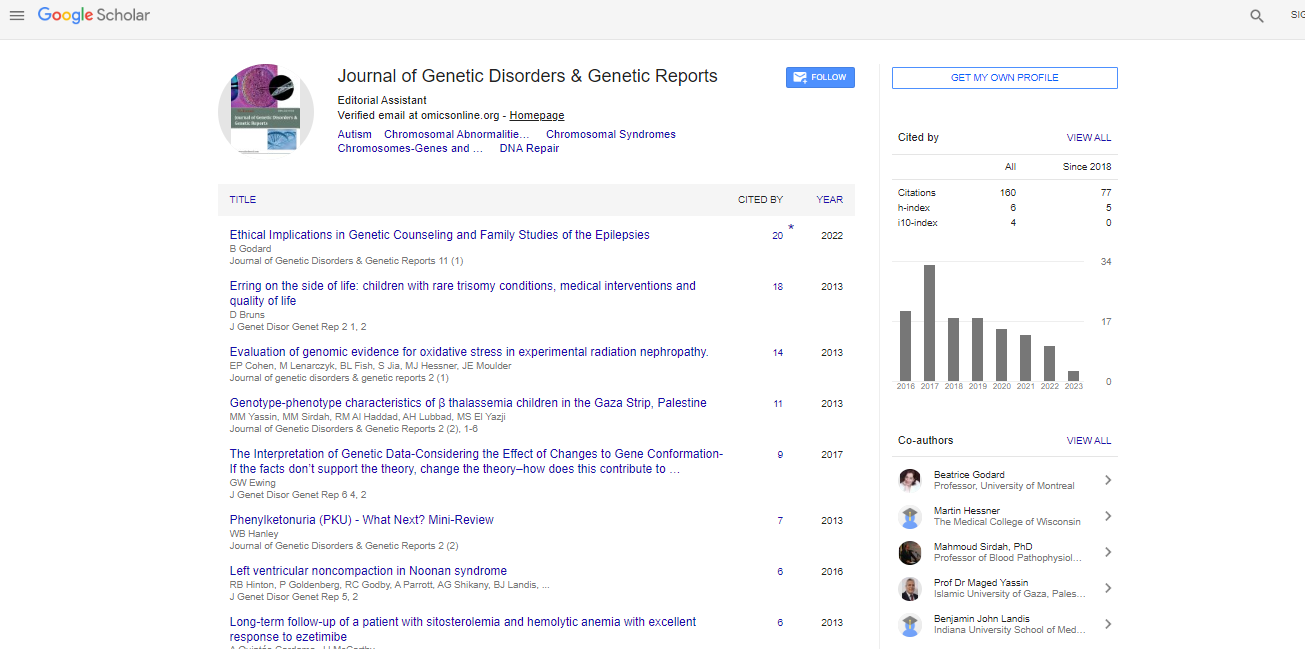Commentary, J Genet Disor Genet Rep Vol: 12 Issue: 4
Gene Therapy for Inherited Genetic Disorders: Recent Breakthroughs and Challenges
Jiayi Kevin*
1Department of Medical Genetics and Center for Rare Diseases, Zhejiang University School of Medicine, Zhejiang , China
*Corresponding Author: Jiayi Kevin,
Department of Medical Genetics and Center
for Rare Diseases, Zhejiang University School of Medicine, Zhejiang , China
E-mail: kevinjiyayi6@gmail.com
Received date: 25 July, 2023, Manuscript No. JGDGR-23-113884;
Editor assigned date: 28 July, 2023, PreQC No JGDGR-23-113884(PQ);
Reviewed date: 11 August, 2023, QC No JGDGR-23-113884;
Revised date: 21 August, 2023, Manuscript No JGDGR-23-113884(R);
Published date: 28 August, 2023, DOI: 10.4172/2576-1439.1000217.
Citation: Kevin J (2023) Gene Therapy for Inherited Genetic Disorders: Recent Breakthroughs and Challenges. Int J Genet Disor Genet Rep 12:4.
Description
Gene therapy has emerged as a potential path for the treatment of inherited genetic disorders, offering the potential to correct the underlying genetic defects. Inherited genetic disorders, caused by mutations in specific genes, often result in significant morbidity and a lifelong burden for affected individuals and their families. Traditional treatments for these disorders have been limited to managing symptoms and complications. However, gene therapy has shown potential as a potential cure by addressing the root genetic cause.
Gene therapy approaches
Gene replacement therapy: Gene replacement therapy aims to introduce a functional copy of the defective gene into the patient's cells. Viral vectors, such as Adeno-Associated Viruses (AAVs) and lentiviruses, are commonly used to deliver therapeutic genes.
Gene editing: Gene editing techniques, including CRISPR-Cas9, allow for precise correction of genetic mutations at the Deoxyribonucleic Acid (DNA) level. These approaches hold great potential for disorders caused by single-point mutations.
RNA-based therapies: Ribonucleic acid (RNA)-based therapies, such as RNA interference (RNAi) and Antisense Oligonucleotides (ASOs), modulate gene expression at the RNA level. They are effective for disorders involving aberrant RNA processing.
Recent breakthroughs
Spinal Muscular Atrophy (SMA): Gene therapy using AAV vectors has shown remarkable success in treating SMA, a devastating neuromuscular disorder. The FDA-approved therapy, Zolgensma, has transformed the prognosis for infants with SMA.
Hemophilia: Gene therapy trials for hemophilia A and B have demonstrated sustained clotting factor production, reducing bleeding episodes. Several therapies are in late-stage clinical development.
Cystic fibrosis: Recent advances in Cystic Fibrosis Transmembrane Conductance regulator (CFTR) gene editing and delivery technologies hold promise for treating cystic fibrosis. Clinical trials are underway to assess the efficacy of these approaches.
Lysosomal storage disorders (LSDs): Gene therapy trials for LSDs, such as Gaucher disease and mucopolysaccharidoses, have shown promising results in alleviating symptoms and improving quality of life.
Challenges and ethical considerations
Safety and long-term efficacy: Ensuring the long-term safety and efficacy of gene therapy remains a challenge, especially for disorders with complex disease mechanisms.
Delivery: Effective and targeted delivery of therapeutic genes to the appropriate tissues and cells can be challenging, particularly for diseases affecting multiple organ systems.
Immunogenicity: Immune responses to viral vectors or therapeutic proteins may limit the effectiveness of gene therapy and require immunomodulatory strategies.
Ethical concerns: Ethical considerations include equitable access to gene therapies, the potential for germline editing, and informed consent for experimental treatments.
Future directions: The future of gene therapy for inherited genetic disorders holds potential , with ongoing research focusing on optimizing delivery methods, improving safety profiles, and expanding the range of treatable conditions. Collaborations among researchers, clinicians, regulatory agencies, and patient advocacy groups are important to advancing the field responsibly.
Conclusion
Gene therapy has made significant strides in recent years, offering new hope for individuals with inherited genetic disorders. Breakthroughs in treatments for diseases like SMA, hemophilia, cystic fibrosis, and LSDs underscore the potential of gene therapy to transform lives. However, challenges related to safety, delivery, and ethics must be addressed as the field continues to evolve. With continued research, innovation, and ethical safeguards, gene therapy is poised to play a pivotal role in the future of medicine, offering the possibility of cures for a wide range of genetic disorders and improving the quality of life for countless individuals and their families.
 Spanish
Spanish  Chinese
Chinese  Russian
Russian  German
German  French
French  Japanese
Japanese  Portuguese
Portuguese  Hindi
Hindi 



